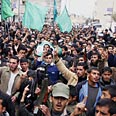
PA infighting to escalate, Shin Bet official says
Security service's deputy chief tells cabinet Hamas, Fatah are arming themselves and preparing for next wave of clashes. 'We have no indications that Iranian experts aided Hamas,' he says, adding that Marwan Barghouti is not necessarily a moderating element
"The reason we say this is because each side is attempting to arm itself and is preparing for the next wave of clashes," he added.
Addressing the ceasefire declared by the two organizations over the weekend, Y. said that "this is at least the tenth claming effort, but it doesn’t seem as if it's going toward a truce."
"The tension in the field is high. From our perspective, the past 10 days saw the stormiest clashes in the Palestinian Authority in recent years."
Prime Minister Ehud Olmert stressed that Israel was following the conflict, so far without interfering.
"We have nothing to do with it and we are not involved in the Palestinians' internal clashes. This is an internal matter which we are not happy about. We do not view this as a breakthrough which helps to create a desired process. We hope that this violence stops and we definitely hope that their violence towards us stops," he said.
Although Israel is not interfering, it has a clear opinion on the side it favors in the conflict.
"We are interested in seeing the stances presented by (Palestinian President Mahmoud Abbas) design the Palestinian government, rather than Hamas' stances," Olmert said.
"If Hamas were to adopt the Quartet's decisions, recognize agreements, halt terror and return Gilad Shalit, then such a government – even if Hamas is part of it – could be a partner for a dialogue," he added.
Minister Gideon Ezra asked during the meeting whether Israel was doing enough to bolster the moderates and whether Israel could consider releasing Palestinian prisoners, including Marwan Barghouti, due to this popularity.
Y. replied, "There is a gap between the public image and the intelligence we have on Barghouti's stances and his role as a moderating element."
'University raid an unusual activity'
The deputy chief also addressed Thursday's raid of the Islamic University in Gaza, and particularly the reports the Iranian arms experts were seized during the raid.
"It was an unusual activity," he said. "We have no confirmation that there were Iranian elements there. This information should be taken with a grain of salt. We have no intelligence and media indication regarding a possibility of Iranian elements."
Following the report on the raid, Palestinian sources said that the most senior Iranian agent, a general, was in charge of Hamas' arms project and had even trained activists manufacturing explosives at the university labs.
Palestinian President Abbas and Hamas politburo chief Khaled Mashaal are expected to meet Tuesday in another effort to reach a truce. The meeting, according to Y., may also be joined by Fatah official Mohammed Dahlan.
"The Saudis invited them for another meeting in a bid to reach a ceasefire, but in principle, we don’t see any change in Hamas' stance," he said.
According to the Shin Bet, the chances that an agreement on a unity government would be reached on Tuesday were slim.
"There may be remarks on progress there, but we do not expect an agreement on a unity government. We believe the parties don't want a civil war, don't want total chaos, but that that is exactly what is happening," Y. said.
Y. estimated that the results of the violent clashes and the Palestinian people's distress would also be felt in Israel at a certain stage.
"Although there are no humanitarian problems and food shortage, but there is political, economic and security instability, and this is destabilizing the Palestinian institutions and society. This may cause part of the intra-Palestinian fire to move in our direction, in a bid to find a common denominator in order to calm the internal problems.
"The Fatah organizations are not controlled by the Fatah leadership today. This is one of the tragedies of the Palestinian people in the past few years. If in the past Hamas and Jihad were rebellious and did not listen to the leadership, today Fatah is in the same situation.
"These organizations have no central command and no father figure, and this is one of the main problems, both in the Palestinian society and towards us. This is a process which has been going on for three years now."










